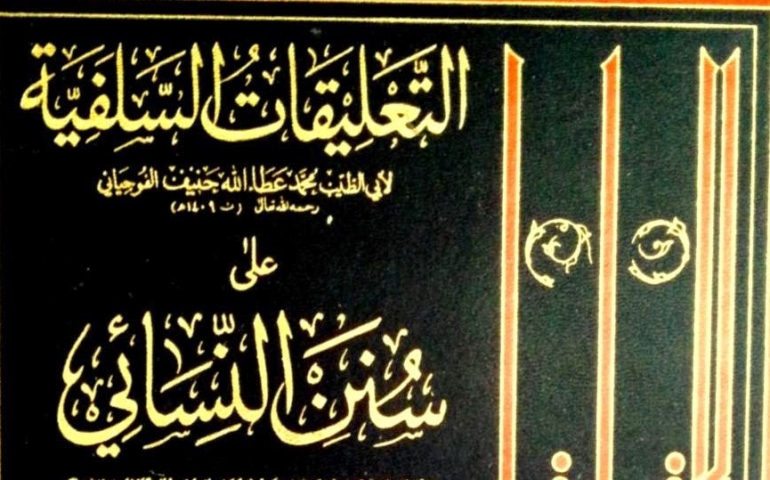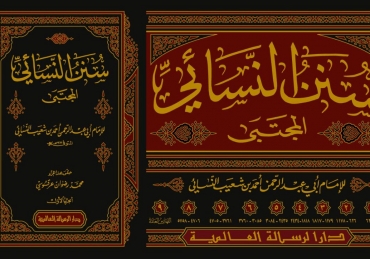Commentaries of Sunan al-Nasāʾī
Question
I pray Sufi Ṣāḥib is in the best of health. I have been given the responsibility to teach Sunan al-Nasāʾī. Which commentary will be the best for the chapters of Ṣalāh?
بسم الله الرحمن الرحیم
Answer
There are several commentaries of Sunan al-Nasāʾī. Some are listed below which you should use:
- The Ḥāshiyah of Ḥāfiẓ Suyūṭī (d. 911/1505).
- The Ḥāshiyah of ʿAllāmah Sindī (d. 1138/1726). Both these are widely available and some editions of the Sunan have both printed with it.
- Al-Fayḍ al-Samāʾī ʿalā Sunan al-Nasāʾī, by Ḥaḍrat Mawlānā Rashīd Aḥmad Gangohī (d. 1323/1905), with additions from Shaykh al-Ḥadīth Mawlānā Muḥammad Zakariyyā Kāndhelwī (d. 1402/1982). Recently published by Maktabah Khalīliyyah, Saharanpur in three volumes with some footnotes by Shaykh al-Ḥadīth Mawlana Muḥammad ʿĀqil (b. 1356/1937). In the UK, the book is available from Qurtuba Books, Leicester. This is not a comprehensive commentary of the Sunan, but has some very beneficial notes somewhat similar to al-Kawkab al-Durrī.
- Dhakhīrat al-ʿUqbā fī Sharḥ al-Mujtabā, by Shaykh Muḥammad ibn ʿAlī ibn Ādam al-Ityūbī (b. 1365/1946-7). This 42-volume collection is the most comprehensive commentary on the Sunan. It is useful from an ʿIlal, Ḥadīth and language perspective. The profiles of narrators, which have lengthened the volume of the book, serve as a useful reference, generally removing the need to consult Tahdhīb al-Kamāl, Tahdhīb al-Tahdhīb or Taqrīb al-Tahdhīb. The author quotes extensively from earlier sources which is useful but this makes it a long read. The book is available online as well. The author is from an Ahl Ḥadīth background and is harsh in his tone in relation to matters of Fiqh in particular. However, this should not prevent you from benefiting from this beneficial collection.
- Al-Taʿlāqāt al-Salafiyyah ʿalā Sunan al-Nasāʾī, by the Ahl Ḥadīth scholar Shaykh Muḥammad ʿAṭāʾ Allah Ḥanīf (d. 1407/1987). The author has used four earlier Ḥawāshī on the Sunan including the first two listed above and two others not listed here and compiled the footnotes. Our respected teacher Muḥaddith al-ʿAṣr Shaykh Muḥammad Yūnus Jownpūrī (d. 1438/2017) sometimes quotes from this book. It is available online and also printed as the footnotes of some of the Pakistani copies of the Sunan.
In addition to these, use Fatḥ al-Bārī and the commentary of Ṣaḥīḥ Muslim by Imām Nawawī (d. 676/1277). As you are teaching the chapters of Ṣalāh, for the Ḥanafī perspective, refer to the books of Imām Muḥammad ibn al-Ḥasan (d. 189/805) along with Naṣb al-Rāyah, ʿUmdat al-Qārī, Fatḥ al-Qādīr, Iʿlāʾ al-Sunan and Awjaz al-Masālik. You will also find it useful to use the books of ʿĀllamah Laknawī (d. 1304/1886), particularly al-Siʿāyah and al-Taʿliq al-Mumajjad along with the books of ʿAllāmah Anwar Shāh Kashmīrī (d. 1352/1933). For the views of other schools of thought, it is always useful to refer to the original sources. You will also find Nibrās al-Sārī of Muḥaddith al-ʿAṣr Shaykh Muḥammad Yūnus Jownpūrī (d. 1438/2017) beneficial.
Allah knows best
Yusuf Shabbir
15 Jumādā al-Ūlā 1439 / 31 January 2018
Approved by: Mufti Shabbir Ahmed and Mufti Muhammad Tahir






Explanation of a narration in Sahih Ibn Hibban